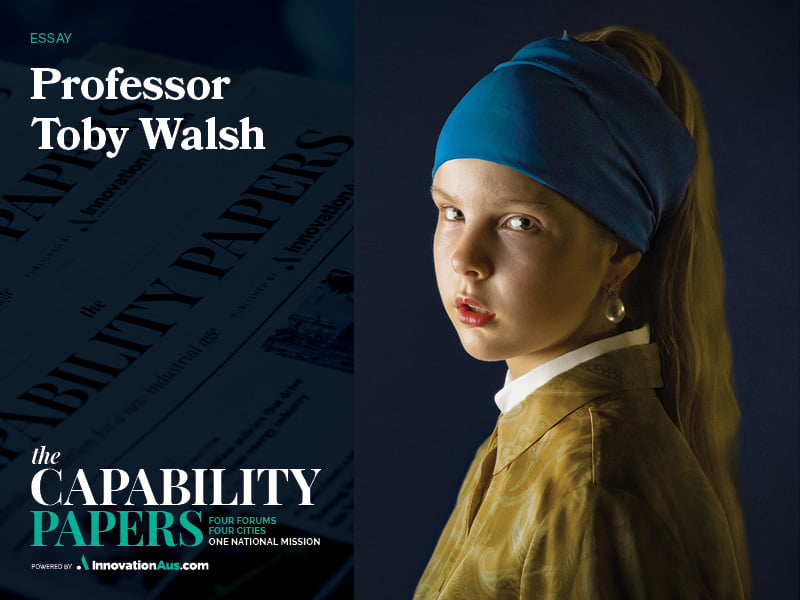What were the most important achievements of the Morrison government? I asked Microsoft Bing chat.
Alongside managing the COVID-19 pandemic, the AI chatbot nominated AUKUS, the trilateral security pact between Australia, the United Kingdom, and the United States. The pact aims to bolster deterrence and cooperation in the Indo-Pacific region.
The US and Australia are both physically part of this region so clearly have skin in the game, but interestingly the UK is not.

Nevertheless, I would agree with Bing. As the political, economic and military centre of the world shifts eastwards, the Indo-Pacific region is going to play an ever more important role both in our future and in that of the rest of the world.
AUKUS has three legs. The first leg involves the replacement of Australia’s current conventional submarines by nuclear-powered submarines using US and UK expertise.
The second leg looks to strengthen the cooperation between the three nations on cyber, AI, and quantum technologies.
And the third leg is a deeper integration of our defence and security supply chains and industries.
The submarines have, unsurprisingly, proved to be controversial. And while the Albanese government has doubled down on this undersea commitment, the Australian submarines won’t hit the water before the early 2040s.
A Nobel Prize winning physicist recently told me he wouldn’t be surprised if quantum and other new technologies had made the seas transparent by 2050.
Therefore, the strategic importance of the submarines might well be minimal, even supposing some future government doesn’t repurpose the money for the AUKUS submarines for more immediate social, economic or environmental concerns.
However, one of the other legs of AUKUS, the leg focusing on AI, cyber and quantum technologies might, I suspect, prove to be the most important legacy of the last government. And if Australia is to be an equal partner in this pact, we will need a serious sovereign AI capability to bring to the trading table.
Even putting AUKUS aside, AI is set to play a critical role in Australia’s future economy. A study by PwC in 2017 estimated AI would grow the world’s economy by $15.7 trillion by 2030. This is more than the current output of China and India combined.
According to this study, Australia’s GDP would grow by $315 billion – or over 10 per cent – due to AI by 2030.
An even more recent report from the Technology Council of Australia and Microsoft, estimated that generative AI alone could be worth $115 billion to the Australian economy by 2030. It’s clear that there’s a lot in play.
Other nations have made a clear and bold commitment to this AI future. China has for example been very clear in its ambitious and comprehensive plan to seek economic, military and political dominance through AI.
China aims to be a world leader in AI by 2030, and indeed is well on target to achieve this. By many measures such as scientific publications, patents and venture funding, it is already neck and neck with the US.
China’s plans focus on seven key areas: medical imaging, smart voice, smart vision, smart city, smart agriculture, smart manufacturing, and smart defence. Most of these areas are of vital importance to Australia.
Countries similar in size and politics to Australia have also announced bold and ambitious AI plans. The UK’s AI plans are, for instance, focused on four strategic pillars: responsible AI, a skilled and diverse AI workforce, an innovative and competitive AI economy, and AI as a force for good.
The UK government published its first National AI Strategy in September 2021, setting out a ten-year plan to “make Britain a global AI superpower.”
In July 2022, the UK government announced its AI Action Plan detailing how it will deliver on this strategy. In total, the UK government is investing over £2 billion in AI over the next decade or so.
At present, Australia sadly looks set to miss this boat (and we all know that boats are problematic in Australian politics).
In total, the federal government has announced plans to invest just $124.1 million in AI over the next six years.
By comparison, the UK government is spending around twenty times on AI what Australia is, despite the UK economy and population being just three times bigger.
Australia’s position is perhaps best summarised by Prime Minister Morrison’s digital plan to be fast adopters not creators.
The fundamental problem with such a digital plan is that adopters don’t get the rewards that creators do, and that adopters don’t get to choose what the technology does.
Many people are rightly concerned about the direction of travel of AI technologies. Are these going to become weapons of mass misinformation? Will they widen inequalities within and between countries?
Are we moving towards an Orwellian future? And who will build the specific AI technologies that will help us fight bushfires or grow crops on a climate ravaged Australian continent?
Adopting someone else’s technology isn’t going to work.
All of this demands that Australia develops its own sovereign AI capability. This capability will strengthen our economic stability, enhance our security against our AI powered neighbours, and give us bargaining power in places like AUKUS.
There are three components to this sovereign capability: people, data and compute. The most limiting factor in developing and applying AI today is people.
There are not enough people with the AI skills to take advantage of the opportunities available today, let alone to build new capabilities for tomorrow. This is an easy problem to fix.
A study by PwC estimated that there were only around 10,000 PhDs in AI on the planet. A plan to train 2,000 PhDs in AI in Australia would cost less than $300 million yet would corner over 10 per cent of the market in AI doctorates.
I can think of few other technological opportunities where such a small investment could capture such a large fraction of the market.
Another example of investing in people is Finland. As part of its AI strategy, Finland announced a plan to educate 10 per cent of its population of 5.5 million people about AI. Major employers in Finland signed up to the scheme.
In the last five years, the online ‘Elements of AI’ course so far has helped over 100,000 people in Finland acquire some basic AI literacy. Australia could have a similar ambition.
The second component of developing a sovereign AI capability is data. AI, especially machine learning is being driven by access to large datasets. Indeed, much of the recent progress in AI is down to this.
With careful planning, Australia could position itself well here. We have a joined-up health care and education sector. Challenging issues need to be managed concerning privacy and the like. But if they are, the Australian people could see great rewards.
The third component of developing a sovereign AI capability is compute. The UK government, for instance, just announced £900 million to invest in compute to support its generative AI ambitions.
Australia needs to consider making a similar investment in its computational future.
There is a fourth component. This is not needed to ensure Australia has a sovereign AI capability. But it is needed if that capability is to be deployed responsible. That fourth component is regulation.
Sam Altman, the chief executive officer at OpenAI, the company behind ChatGPT, put it clearly:
“Regulatory intervention by governments will be critical to mitigate the risks of increasingly powerful [AI] models. For example, the US government might consider a combination of licensing and testing requirements for development and release of AI models…”
Here, pleasingly the Australian government is already on the front foot. A public consultation on regulating AI has closed. And I am confident we can expect suitable regulation, perhaps along the lines of the EU AI Act, to protect Australia’s interests, especially its citizens.
Such regulation will fit alongside the more vigorous application of existing law to the digital space, and other efforts such as standards and industry guidelines
With these four components in place, Australia can continue to be the ‘lucky country’, experiencing continuing economic prosperity and giving all of its population a fair go.
Professor Toby Walsh is Chief Scientist at University of NSW’s new AI institute (UNSW.AI). He is a strong advocate for limits to ensure AI is used to improve our lives, having spoken at the UN, and to Heads of State, parliamentary bodies, company boards and many others on this topic. This advocacy has led to him being “banned indefinitely” from Russia. He is a Fellow of the Australia Academy of Science and was named on the international “Who’s Who in AI” list of influencers. He has written four books on AI for a general audience, the most recent is “Faking It! Artificial Intelligence
in a Human World”.
Do you know more? Contact James Riley via Email.

